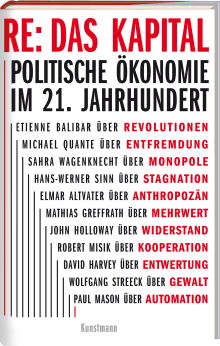Political Economy in the 21st Century
Globalization, financial crisis, climate change, poverty revolt, weak growth – these are just some of the multiple challenges facing western societies. “Is this the end of capitalism?” is a question now tabled at elite world economic summits. Reason enough to look again at Marx’s Capital, the work which reveals the “laws of motion” of capitalist societies, criticizes the blind spots of economic sciences, and hones the very concepts with which we comprehend the world we live in.
Current phenomena may seem far removed from the world in which Marx wrote his book, but Capital does more than merely describe the germ out of which our world grew. It also considers the history of its emergence and the dynamics of the capitalist mode of production (which has increased affluence around the world in unimaginable ways) and identifies in them the finite nature of capitalism, the mechanisms of its destruction and the powers which might overcome it.
Does all this still apply in the age of turbo capitalism?
Sociologists, journalists, politicians, philosophers and economists re-read Capital. Starting out from a chapter of the work, each draws parallels with the present day and reflects upon both the enduring relevance and the limitations of Marxist theory. Their essays are subjective and firmly focused on political possibilities. After all, as Marx would have it, the point is not only to interpret the world, but to change it.
“Marx is as relevant now as ever: he described the society in which we are living today – including the financial crisis.” Franziska Augstein
New readings of Karl Marx’s Capital on the 150th anniversary of its publication.
Eight sociologists, economists and philosophers translate Marx into the 21st century
For readers of Thomas Piketty, Eric Hobsbawm and Ha-Joon Chang.



